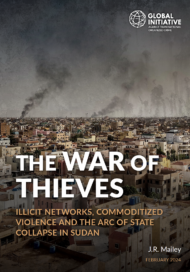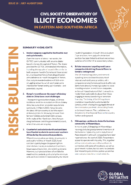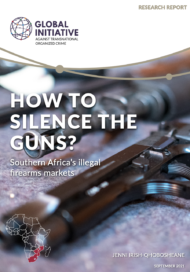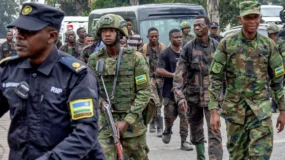In late October 2025, the Rapid Support Forces (RSF), a paramilitary organization fighting for control of Sudan, captured the city of El Fasher, in Darfur, marking yet another step in the country’s bloody civil war. Tens of thousands of civilians have fled the city and thousands have reportedly been killed. With the fall of the Sudanese Armed Forces’ (SAF) last stronghold in western Sudan – coming two months after RSF leader Mohamed Hamdan Dagalo (Hemedti) declared a parallel state in Nyala – Sudan’s east–west split is now almost complete.
Although the international community has condemned the reported mass atrocities, unlawful killings and sexual violence, and refused to recognize the RSF’s self-proclaimed government, formal legitimacy is not what keeps the paramilitary force alive. This non-recognition of the RSF is belied, however, by a vast international network of complicity, involving illicit trade and organized crime. While much attention has focused on Chad and eastern Libya as likely conduits for material support from the United Arab Emirates (UAE), the RSF also depends on Kenya, Uganda, South Sudan and the Central African Republic (CAR) as logistics corridors for trafficking military supplies and smuggling gold.
For a time, the SAF, backed by Türkiye, Iran, Egypt and Russia, appeared to be gaining ground against the RSF in western Sudan, having disrupted several important supply lines. Yet the fall of El Fasher demonstrates the RSF’s resilience and the breadth of the networks that sustain it. There is a real danger that the RSF could expand again and open fresh fronts, underscoring the urgent need for coordinated international and domestic pressure to be exerted on countries in the region.
Chad’s shifting role
Shortly after the war in Sudan broke out in April 2023, Chad faced credible allegations of facilitating RSF military resupply operations, with airports in Amdjarass and Abéché reportedly serving as hubs for UAE-supported cargo flights. These claims intensified resentment among Chad’s influential Zaghawa community, whose members straddle the Sudanese border and have been targeted by RSF violence. Mounting domestic opposition, combined with the SAF’s growing capacity to intercept supply routes and its threats to strike targets inside Chad, ultimately pressured N’Djamena to scale back its cooperation with the RSF.
In 2025, the number of flights from the UAE to eastern Chad decreased. Air traffic subsequently shifted northwards to Kufra in eastern Libya, or directly into Nyala, South Darfur, under the cover of darkness. The RSF’s capture in June of the border area where Sudan, Libya and Egypt converge, supported by a Libyan militia aligned with Khalifa Haftar, commander of the Libyan National Army, further facilitated onward ground supply routes from Kufra to the RSF.
Internal fractures within Chad’s security apparatus contributed to intelligence leaks that exposed covert state support for the RSF – most notably the alleged diversion of Chinese-supplied air defence systems originally delivered to Chad, and the facilitation of vehicle shipments to Sudan through the port of Douala in Cameroon and via Chad. Seeking to limit reputational damage following these revelations, N’Djamena has recently attempted to signal distance from the RSF, including by returning vehicles that were looted in Sudan by the RSF and trafficked across the border into Chad.
Although some trafficking routes through Chad remain active – especially established flows of arms and military materiel through its northern regions – the country has clearly moved on from being the RSF’s primary rear base to becoming a contested and less reliable corridor.
Looking south
As Chad’s support has waned, the RSF’s attention has not only shifted north to Libya but also southwards. In recent months, South Sudanese– and Kenyan-registered aircrafts have been observed landing in Nyala and offloading supplies. Kenyan-registered aircrafts have also transported wounded RSF fighters. In February 2025, Kenya hosted the RSF meetings that produced a charter for Nyala’s ‘parallel government’, and in June the SAF accused Kenya of supplying arms to the RSF. This was met by strong denial from Nairobi. In August, the United States Senate called for an investigation into Kenya’s links to the RSF as part of its review of Kenya’s ‘major non-NATO ally’ status, a designation granted in 2024 that affords Nairobi significant military and financial privileges.
Controversial aviation links also lead to Uganda. In May 2025, the SAF destroyed a Kenyan-registered Boeing 737 in Nyala that had been converted for cargo and was allegedly carrying RSF military supplies. The Global Initiative Against Transnational Organized Crime later confirmed with local sources that the aircraft was in fact operated from Entebbe, Uganda, where its owner and pilot resided.
South Sudan has become central to the RSF’s gold economy. In March 2024, several hundred kilograms of gold supposedly produced in the militia’s industrial mine in Songo were transported to Wau in South Sudan and flown to Juba on a commercial airliner, before being transferred to a private jet bound for the UAE. There have also been reports of artisanal gold originating in RSF territory being smuggled through South Sudan.
Lastly, the CAR has also potentially become a conduit for external support for the RSF. Early in the conflict, the RSF received weapons on at least two occasions from the north-east of the country. The Russia-backed Wagner Group has allegedly been involved in such transfers. However, relations between Wagner and the RSF appear to have deteriorated amid allegations in early 2025 that the mercenary group was making cross-border incursions from the CAR into Darfur. Meanwhile, Abu Dhabi has begun courting Bangui with proposals to refurbish Birao airport, near the Sudan border, raising concerns that the site could become a new supply hub for the RSF.
While the CAR’s support for the RSF has not yet materialized, the country is increasingly becoming an attractive option for the paramilitary group, given the SAF’s mounting pressure on southern aviation routes. Since December 2023, Sudan’s Civil Aviation Authority has overseen South Sudan’s airspace due to the latter’s delays in establishing its own system, granting the SAF valuable intelligence on suspicious overflights, including those from Kenya and Uganda. The RSF is apparently adapting to this reality by constructing dozens of makeshift airstrips across Darfur and Kordofan. Designed for light aircraft, these strips bypass formal air-control networks and are less vulnerable to SAF drone attacks. Many are located adjacent to gold extraction sites, and could therefore fulfil the dual role of replenishing arms supplies and smuggling gold out.
The RSF’s networks extend across the region, forming an opaque web of commercial, criminal and political interests. Exposing the actors involved and their practices in these hubs is essential to disrupting their operations. Accurate information can inform targeted sanctions, aviation monitoring and diplomatic engagement with countries serving as sources or transit points. Civil society, the media and opposition groups can also play a part by challenging enabling policies, as Chad’s example shows. Coordinated, region-wide action targeting all critical hubs is needed to meaningfully constrain the RSF’s operating space and halt the group’s growing momentum.
The GI-TOC’s forthcoming report ‘Collateral circuits: The impact of Sudan’s war on arms markets and mercenary networks in Chad and Libya’ offers an in-depth analysis of how Sudan’s conflict has activated new regional supply nodes, and expanded and reshaped trafficking infrastructures.
Corridors contestés: Les chaînes d’approvisionnement transnationales illicites qui alimentent le conflit soudanais
Fin octobre 2025, les Forces de soutien rapide (FSR), une organisation paramilitaire engagée dans la lutte pour le contrôle du Soudan, ont investi la ville d’El Fasher, au Darfour, marquant une nouvelle étape dans le conflit meurtrier qui secoue le pays depuis plus de deux ans. Des dizaines de milliers de civils ont fui la ville et des milliers auraient été tués. Avec la chute du dernier bastion des Forces armées soudanaises (SAF) dans l’ouest du pays – deux mois après que Mohamed Hamdan Dagalo (Hemedti), chef des FSR, a proclamé un État parallèle à Nyala – la fracture entre l’est et l’ouest du Soudan est désormais presque complète.
Bien que la communauté internationale ait condamné les atrocités de masse, les exécutions sommaires et les violences sexuelles, et refusé de reconnaître le gouvernement autoproclamé des FSR, cette force paramilitaire ne doit sa survie ni à la légitimité ni à la reconnaissance internationale. Ce refus de reconnaissance contraste avec un vaste réseau de complicités à l’échelle internationale, mêlant commerce illicite et criminalité organisée. Si l’attention s’est concentrée sur le Tchad et l’est de la Libye comme points de passage probables pour le soutien matériel des Émirats arabes unis (EAU), les FSR dépendent également du Kenya, de l’Ouganda, du Soudan du Sud et de la République centrafricaine (RCA) comme corridors logistiques pour le trafic d’équipements militaires et la contrebande d’or.
Pendant un temps, les SAF, soutenues par la Turquie, l’Iran, l’Égypte et la Russie semblaient reprendre l’avantage contre les FSR dans l’ouest du Soudan, ayant perturbé plusieurs lignes d’approvisionnement importantes. Pourtant, la chute d’El Fasher démontre la résilience des FSR et l’étendue des réseaux qui les soutiennent. Le risque est réel que les FSR s’étendent à nouveau et ouvrent de nouveaux fronts, soulignant l’urgence d’une pression coordonnée, internationale et nationale, sur les pays de la région.
Le rôle changeant du Tchad
Peu après le déclenchement de la guerre au Soudan en avril 2023, le Tchad a été accusé de manière crédible d’avoir facilité les opérations de réapprovisionnement militaire des FSR, les aéroports d’Amdjarass et d’Abéché servant, selon toute vraisemblance, de hubs pour des vols cargo soutenus par les EAU. Ces accusations ont intensifié le ressentiment au sein de la puissante communauté zaghawa du Tchad, dont les membres vivent de part et d’autre de la frontière soudanaise et ont été ciblés par les violences des FSR. L’opposition intérieure croissante, combinée à la capacité accrue des SAF à intercepter les routes d’approvisionnement et à leurs menaces de frapper des cibles au Tchad, a finalement poussé N’Djamena à réduire sa coopération avec les FSR.
En 2025, le nombre de vols des EAU vers l’est du Tchad a diminué. Le trafic aérien s’est ensuite déplacé vers le nord, à Kufra en Libye orientale, ou directement vers Nyala, au Darfour-Sud, sous couvert de nuit. La prise en juin par les FSR de la zone frontalière où se rejoignent le Soudan, la Libye et l’Égypte, avec le soutien d’une milice libyenne alliée à Khalifa Haftar, chef de l’autoproclamée Armée nationale libyenne, a encore facilité les routes terrestres d’approvisionnement depuis Kufra vers les FSR.
Les fractures internes au sein de l’appareil sécuritaire tchadien ont contribué à des fuites de renseignements révélant un soutien étatique clandestin aux FSR – notamment la diversion présumée de systèmes de défense aérienne fournis par la Chine et initialement livrés au Tchad, ainsi que la facilitation de livraisons de véhicules vers le Soudan via le port de Douala au Cameroun et par le Tchad. Cherchant à limiter les dégâts réputationnels après ces révélations, N’Djamena a récemment tenté de prendre ses distances avec les FSR, notamment en restituant des véhicules volés au Soudan par les FSR et acheminés au Tchad.
Bien que certaines routes de trafic à travers le Tchad restent actives – en particulier les flux établis d’armes et de matériel militaire dans ses régions septentrionales – le pays est clairement passé du statut de base arrière principale des FSR à celui de corridor contesté et moins fiable.
Cap au sud
Alors que le soutien du Tchad s’est affaibli, l’attention des FSR s’est déplacée non seulement vers le nord, en Libye, mais aussi vers le sud. Ces derniers mois, des avions immatriculés au Soudan du Sud et au Kenya ont été observés atterrissant à Nyala et déchargeant des fournitures. Des avions kenyans ont également transporté des combattants FSR blessés. En février 2025, le Kenya a accueilli les réunions des FSR qui ont abouti à la charte du « gouvernement parallèle » de Nyala, et en juin, les SAF ont accusé Nairobi de fournir des armes aux FSR, ce que le Kenya a vigoureusement nié. En août, le Sénat américain a demandé une enquête sur les liens du Kenya avec les FSR dans le cadre de son examen du statut de « allié majeur non-membre de l’OTAN » accordé en 2024, qui confère à Nairobi d’importants privilèges militaires et financiers.
Des liaisons aériennes controversées mènent également à l’Ouganda. En mai 2025, les SAF ont détruit à Nyala un Boeing 737 immatriculé au Kenya, converti en cargo et qui transportait prétendument des fournitures militaires pour les FSR. La Global Initiative Against Transnational Organized Crime a ensuite confirmé, via des sources locales, que l’avion était en réalité exploité depuis Entebbe, en Ouganda, où résidaient son propriétaire et son pilote.
Le Soudan du Sud est devenu central dans l’économie aurifère des FSR. En mars 2024, plusieurs centaines de kilos d’or, supposément extraits de la mine industrielle de la milice à Songo, ont été acheminés vers Wau, au Soudan du Sud, puis transportés à Juba par avion commercial, avant d’être transférés dans un jet privé à destination des EAU. Des rapports font également état d’or artisanal provenant des zones contrôlées par les FSR et passant en contrebande par le Soudan du Sud.
Enfin, la RCA est également susceptible de devenir un canal de soutien externe aux FSR. Au début du conflit, les FSR ont reçu des armes à au moins deux reprises depuis le nord-est du pays. Le groupe Wagner, soutenu par la Russie, aurait participé à ces transferts. Cependant, les relations entre Wagner et les FSR semblent s’être détériorées après des accusations, début 2025, selon lesquelles le groupe de mercenaires effectuait des incursions transfrontalières depuis la RCA vers le Darfour. Parallèlement, Abou Dhabi a commencé à courtiser Bangui avec des propositions de réhabilitation de l’aéroport de Birao, près de la frontière soudanaise, suscitant des inquiétudes quant à la possibilité que ce site devienne un nouveau hub d’approvisionnement pour les FSR.
Bien que le soutien de la RCA aux FSR ne se soit pas encore concrétisé, le pays devient de plus en plus une option attrayante pour le groupe paramilitaire, compte tenu de la pression croissante des SAF sur les routes aériennes du sud. Depuis décembre 2023, l’Autorité de l’aviation civile du Soudan supervise l’espace aérien du Soudan du Sud en raison des retards de ce dernier à mettre en place son propre système, offrant aux SAF des renseignements précieux sur les survols suspects, y compris ceux en provenance du Kenya et de l’Ouganda. Les FSR semblent s’adapter à cette réalité en construisant des dizaines de pistes d’atterrissage improvisées à travers le Darfour et le Kordofan. Conçues pour des avions légers, ces pistes contournent les réseaux de contrôle aérien formels et sont moins vulnérables aux attaques de drones des SAF. Beaucoup sont situées à proximité de sites d’extraction d’or et pourraient donc remplir un double rôle : réapprovisionner en armes et faire sortir l’or en contrebande.
Les réseaux des FSR s’étendent à travers la région, formant une toile opaque d’intérêts commerciaux, criminels et politiques. Mettre au jour les acteurs impliqués et leurs pratiques dans ces hubs est essentiel pour entraver leurs opérations. Des informations précises peuvent éclairer des sanctions ciblées, la surveillance aérienne et l’engagement diplomatique avec les pays servant de sources ou de points de transit. La société civile, les médias et les groupes d’opposition peuvent également jouer un rôle en contestant les politiques permissives, comme l’exemple du Tchad le montre. Une action coordonnée à l’échelle régionale, ciblant tous les hubs critiques, est nécessaire pour réduire de manière significative l’espace opérationnel des FSR et stopper leur dynamique croissante.
Le prochain rapport de la GI-TOC intitulé « Circuits collatéraux : l’impact de la guerre au Soudan sur les marchés d’armes et les réseaux de mercenaires au Tchad et en Libye » propose une analyse approfondie de la manière dont le conflit soudanais a activé de nouveaux nœuds régionaux d’approvisionnement et remodelé les infrastructures de trafic.



